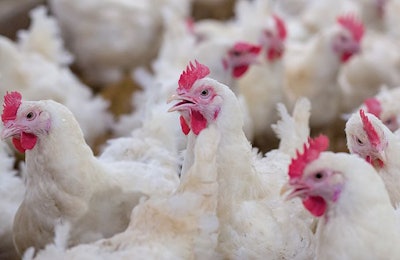
Veterinary authorities in the United Kingdom (UK) have confirmed that a mild form of avian influenza has been diagnosed in a commercial poultry flock in eastern England.
Low-pathogenic avian influenza (LPAI) is responsible for clinical symptoms observed in a commercial broiler breeder flock in the county of Suffolk. Suspicions were raised when egg production suddenly dropped. Subsequent investigations identified an LPAI virus of the H5 family, according to the official report to the World Organisation for Animal Health (OIE). Neuraminidase inhibition assay — which will identify the N-subgroup of the virus — is pending.
The affected flock comprised 27,000 broiler breeders, which had been in lay for 45 weeks. The source of the infection is uncertain, especially because the birds are housed. Previous avian flu outbreaks in the country have been in free-range flocks.
At the time of its report to the OIE, the Department for the Environment, Food and Rural Affairs (Defra) stated that stamping-out of the flock was underway. Arrangements were being made for the disposal of the carcasses, as well as cleaning and disinfection of the farm.
Movement restrictions have been put in place for all premises with poultry or captive birds within 1 kilometer of the outbreak, reported Defra.
Some roads have been closed in the area around the outbreak — near Eye — in order for the control procedures to be carried out at the affected farm, reported Eastern Daily Press.
The last case of LPAI in the U.K. was in Dunfermline, Scotland in January of 2016.
Warning to U.K. poultry owners
“The quick identification of the suspected case by a private veterinary surgeon and swift precautionary measures to contain the disease also illustrate the ongoing importance of a robust veterinary surveillance system,” according to a statement from the British Veterinary Association and the British Veterinary Poultry Association. Any suspected cases should be reported immediately to Defra.
“Bird keepers should remain alert for any signs of disease, report suspected disease immediately and ensure they are maintaining good biosecurity on their premises,” said Chief Veterinary Officer Christine Middlemiss. “We are urgently looking for any evidence of disease spread associated with this strain to control and eliminate it.”
Dr. Gavin Dabrera of Public Health England said that the risk to the general public is “very low.”
Recent LPAI outbreaks in other countries
In early October, the agriculture ministry in France reported the detection of an LPAI virus of the H5 type in a flock of captive mallard ducks in the central department of Loir-et-Cher. According to the ministry’s latest report to the OIE, active surveillance has not revealed any sign of the virus since that time. It has not been possible to determine the neuraminidase grouping of the virus involved in that outbreak.
An LPAI virus of the H5N6 subgroup was recently detected for the first time in poultry in Nigeria.
Avian flu detected in 6 more Taiwanese poultry flocks
For almost 5 years, Taiwan has been struggling to control highly pathogenic avian influenza (HPAI) linked to the H5N2 virus variant.
The Council of Agriculture has recently reported 6 new outbreaks to the OIE. These occurred in the period November 7-27. The virus was detected after suspicious signs were observed in a group of 32 native chickens at the slaughterhouse in the Wanhua district of Taipei city. The other outbreaks—3 in meat ducks and 2 in native chickens—were on farms located in the previously affected counties of Changhua and Yunlin.
In total, more than 45,300 birds were affected by these latest outbreaks, including mortalities of 1,276 native chickens in two flocks.
HPAI in two more South African ostrich flocks
Since mid-2017, the number of outbreaks of H5N8 HPAI in commercial ostrich flocks in South Africa has reached 212. Latest to be affected were in Western Cape Province during September and October, according to a new report from the agriculture department to the OIE.
Avian flu in Iraq 'resolved'
Iraq’s agriculture ministry reported one outbreak of HPAI linked to the H5N8 virus variant to the OIE in March of this year. Around 2,000 birds died and a further 3,000 were destroyed after the presence of the virus was detected at a market in Basra.
The virus has not been detected since that time, and the Iraqi ministry has reported to the OIE that the disease situation has been “resolved.”
View our continuing coverage of the global avian influenza situation.















